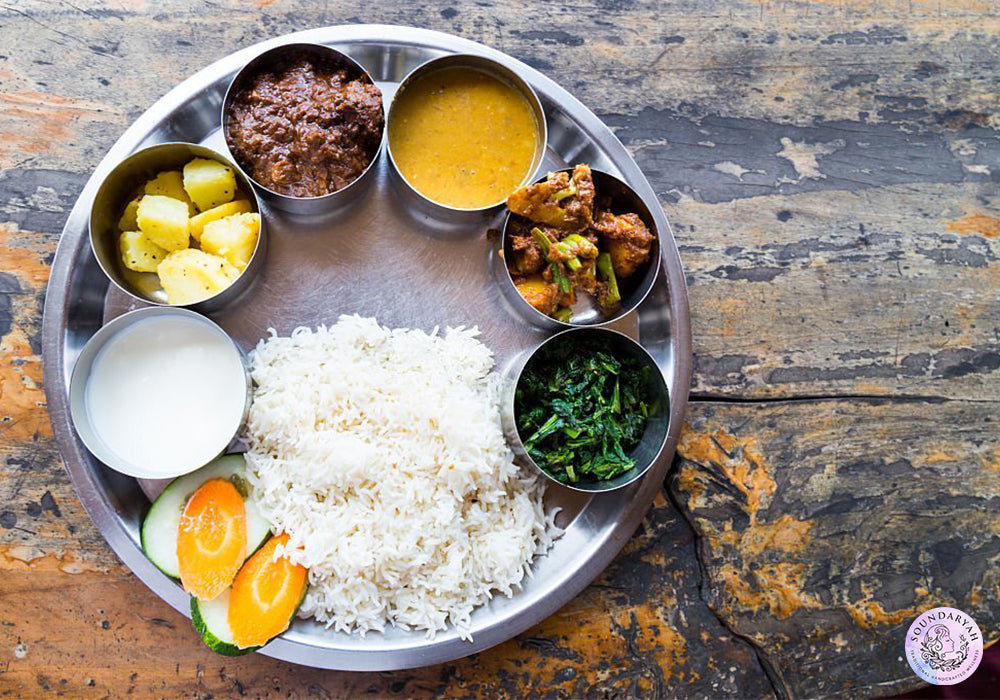Your diet affects your skin a lot, mainly if you are prone to acne. Therefore, it is of utmost importance to ensure that your diet not just aggravates acne but also heals your skin from the inside out!
We are all aware that our daily eating habits create long term impacts on our health. But did you also know that lots of extrinsic factors like weather, seasonal changes, pollution, food quality combine with the intrinsic nature of our unique body and skin types. So, while we all love to treat ourselves to our favourite foods ever wondered why particular sweets give you a bout of acne the very next day or a rainy day treat of hot pakodas coincide unnervingly with a fresh breakout of white heads? Our diet affects our skin, especially if you are eating too much processed carbohydrates. These foods can cause the body to produce more oil and sebum. This increase in sebum clogs the pores on the skin and results in acne. Some factors, such as genetics and skin type that influence acne, are beyond your control. However, what you eat can make a big difference in your overall skin health and the production of sebum. It’s possible for different foods to have different effects on different people but, generally there are a few foods which should be avoided if you have acne-prone skin. These include:
- Breads and refined flour based paranthas
- Deep fried snacks
- Processed sugar, sugary drinks and sweets
With so much uncertainty surrounding the effects of the diet on acne, it can be hard to know which foods to try and which to avoid. Also, certain strategies may work for some people but not for others. Therefore, it is important that you pay attention to your breakouts and ask yourself if certain foods seem to make breakouts worse, and if they get better when you don’t eat those foods.
Foods containing the following ingredients are beneficial for acne-prone skin:
Zinc: Studies suggest that eating foods rich in zinc may be useful in preventing and treating acne. Zinc is a dietary mineral important in skin development as well as regulating metabolism and hormone levels.
Vitamin A and E: Studies suggest that people may be able to lessen the severity of their acne by increasing their intake of foods containing these vitamins.
Antioxidants and Omega-3: Omega-3s are a type of fat found in certain plants and animal-protein sources, such as fish and eggs. Antioxidants are chemicals that neutralize damaging toxins in the body. Together, omega-3s and antioxidants are thought to reduce inflammation.
Healing Diet for Acne Prone Skin

The best diet advice in dealing with acne appears to be eating wholesome, balanced diet rich in fresh fruits and vegetables, healthy protein sources, and whole grains.
1. Green Leafy Vegetables like Spinach, Amaranth, etc.

The antioxidants, vitamins, and minerals in spinach work to reduce hyperpigmentation, which is the key to evening out your skin tone. Vitamin C also promotes collagen formation, helping to repair acne scars faster by increasing cell turnover rate. High in fiber, this low-calorie superfood is packed with vitamins A, B-6, C, and K, manganese, calcium, copper, potassium, magnesium. Mild mustard can make a great facial mask; it will unclog pores, firm the skin, and leave your face feeling smooth. Amaranth is a source of vitamin C, which is vital to the body's healing process because it helps process iron, form blood vessels, repair muscle tissue, and maintain collagen.
2. Sweet Potato

After eating sweet potatoes, your body will convert beta-carotene into vitamin A. This vitamin has properties that will act as a skin barrier against discoloration, inflammation, and clogged pores often brought on by free radicals.
3. Lemon

Lemon helps with increasing collagen production, blocking free radicals and lightening acne scars. However, using it as a topical treatment isn’t recommended. Straight lemon juice is too acidic and can damage your skin’s barrier, causing it to lighten or darken too much after exposure to sunlight. Therefore, it is best to add a dash of lemon to your favourite salad or make a glass of lemon sharbat to keep acne at bay.
4. Pumpkin

Loaded with fruit enzymes, zinc, and alpha hydroxy acids, pumpkin can soften skin and restore pH balance. It’s why you also find it in many masks and exfoliating products. But internally, all that fiber and zinc will do you good too. Zinc helps to regulate the amount of oil production.
5. Amla

Gooseberries might look small in size but they hold great power when it comes to treating acne-prone skin. Having vitamin C circulating in your blood is a powerful weapon against blotchy skin, while the antioxidants from the berries act like a combo attack against those pesky dark spots, stopping them from ever forming in the first place. Amla consists of astringent properties which help in tightening up the skin pour resulting in clear and healthy skin.
6. Legumes and Nuts

Chickpeas, kidney beans, lentils, and peanuts are low-glycemic, so they’re associated with more consistent blood sugar levels and fewer acne flare-ups. Many nuts, like walnuts and almonds, are high in the omega-3 fatty acids that can help fight inflammation, as well as being high in zinc.
7. Yogurt

A healthy gut is key to healthy skin. Try and include probiotic food items like yogurt, Kanji, etc. The live bacteria present in the probiotic products that have been fermented is essential for your gut. A clean gut will ensure a clean face eventually. Kanji is a probiotic drink made in the Northern Indian states. Being a probiotic drink it is extremely good for the gut and improves digestion.
8. Papaya

Papayas contain a digestive enzyme called papain. On your skin’s surface, papain is powerful enough to exfoliate dead skin cells, unclog pores, fade acne scars, hydrate skin and prevent any future breakouts
For the inside, this exotic fruit does wonders too. Its vitamins and minerals improve skin elasticity and can help banish the appearance of fine lines and wrinkles.
9. Salmon and Fatty fish

Indian Mackerel with the skin is the best source for omega-3 fatty acids, but Pomfret are also excellent choices. Omega-3s protect your skin against sun damage, reducing your risk for developing skin cancer and brown spots brought on by prolonged periods of sun exposure. A useful brain food, the pomfret is good for eyesight and healthy hair and skin.
10. Cauliflower

This cruciferous veggie is packed with a powerful amino acid called histidine. Too much sunlight can make existing dark spots worse, but histidine prevents those harmful UV rays from damaging on your skin.

Often times, acne may cause a hindrance to your self-confidence. It's a relationship between your skin and you in which food, products, and your mental health all play a role. Food is only one point on the triangle of naturally supplying vitamins, minerals, and nutrients to your skin so that it can be strong and healthy. It is okay to have breakouts once in a while; we know that you will keep your head high and keep loving yourself no matter what. Always remember to be kind to yourself from inside out!

For more interesting updates do follow us on Facebook and Instagram.


 Verified Purchase
Verified Purchase



![Youthful Glow Herbal Face Wash [100g] - Soundaryah](http://soundaryah.com/cdn/shop/products/1a_b5d64eda-7417-41b9-bad5-b271f4ef68ff_300x.jpg?v=1634899930)
![Royal Herbal Hair Wash [200g] - Soundaryah](http://soundaryah.com/cdn/shop/products/1_300x.jpg?v=1669120964)
![Intensive Body Polishing Ubtan [200g] - Soundaryah](http://soundaryah.com/cdn/shop/products/1a_8728dcb7-c696-447d-b42e-0a56a5326fb6_300x.jpg?v=1634899848)